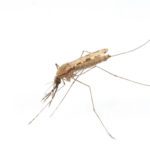Lien vers Pubmed [PMID] – 20634948
Lien vers HAL – inrae-02665364
Lien DOI – 10.1371/journal.pone.0011538
PLoS One 2010 Jul; 5(7): e11538
Invasion of the mosquito salivary glands by Plasmodium is a critical step for malaria transmission. From a SAGE analysis, we previously identified several genes whose expression in salivary glands was regulated coincident with sporozoite invasion of salivary glands. To get insights into the consequences of these salivary gland responses, here we have studied one of the genes, PRS1 (Plasmodium responsive salivary 1), whose expression was upregulated in infected glands, using immunolocalization and functional inactivation approaches.PRS1 belongs to a novel insect superfamily of genes encoding proteins with DM9 repeat motifs of uncharacterized function. We show that PRS1 is induced in response to Plasmodium, not only in the salivary glands but also in the midgut, the other epithelial barrier that Plasmodium has to cross to develop in the mosquito. Furthermore, this induction is observed using either the rodent parasite Plasmodium berghei or the human pathogen Plasmodium falciparum. In the midgut, PRS1 overexpression is associated with a relocalization of the protein at the periphery of invaded cells. We also find that sporozoite invasion of salivary gland cells occurs sequentially and induces intra-cellular modifications that include an increase in PRS1 expression and a relocalization of the corresponding protein into vesicle-like structures. Importantly, PRS1 knockdown during the onset of midgut and salivary gland invasion demonstrates that PRS1 acts as an agonist for the development of both parasite species in the two epithelia, highlighting shared vector/parasite interactions in both tissues.While providing insights into potential functions of DM9 proteins, our results reveal that PRS1 likely contributes to fundamental interactions between Plasmodium and mosquito epithelia, which do not depend on the specific Anopheles/P. falciparum coevolutionary history.




